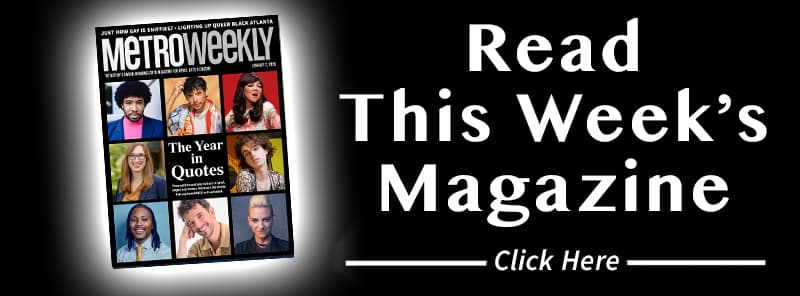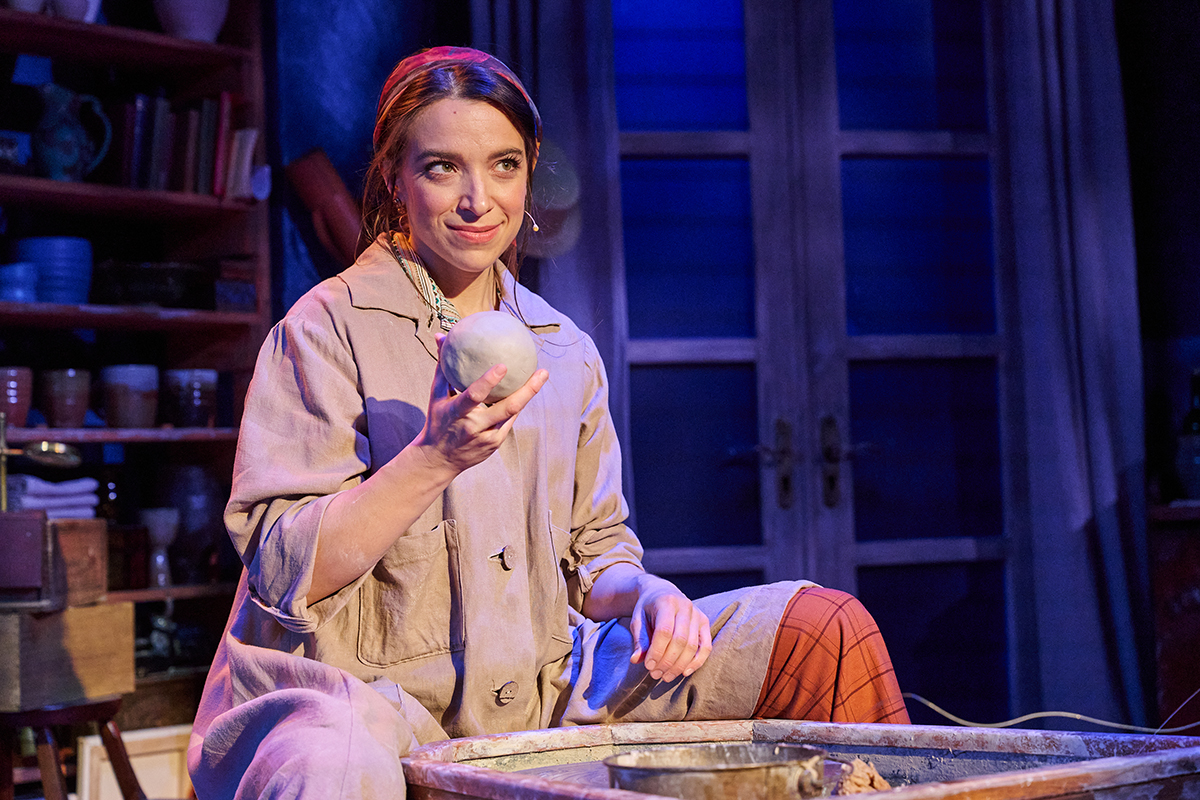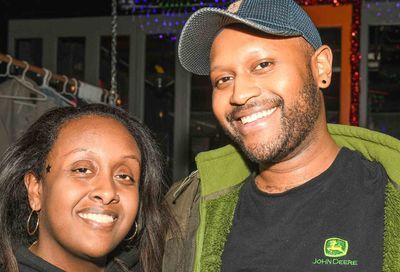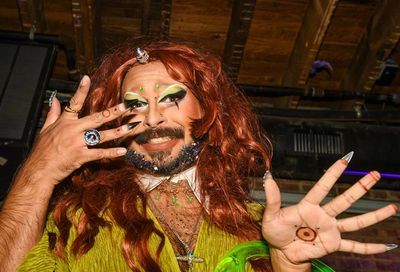Olympia's Spirit
Olympia Dukakis discusses her acting career, gay marriage, and her new play at MetroStage
Ask Olympia Dukakis if she’s as strong a woman as the characters she typically plays in the movies, and the Oscar-winning actress cocks her head ever so slightly to the side, evoking a similar moment in Moonstruck.
“That’s in me,” she says, her voice rich, potent, deep. “But in all honesty, I also have the part of myself that’s insecure, that’s fragile, that’s hypersensitive. But that particular quality of strength is something that has been seen and valued in my career.”
 |
Her answer helps to explain why Dukakis has become a gay icon — right up there with the two Bettes, Barbra and her screen daughter in Moonstruck, Cher — as gay men traditionally adore actresses who play it strong and cut through the bull.
Dukakis’s career overflows with tough, powerful women — women who have a clear sense of their identity and entitlement. Rose Castorini in Moonstruck. Clairee Belcher in Steel Magnolias. Anna Madrigal in the television opus Tales of the City. And most recently, Lila, a mother who must make a harrowing and heartbreaking decision in the gay-themed The Event, a film that Dukakis notes, with a hint of regret, that did not get much of a response from the gay community.
Dukakis is currently hunkered down at MetroStage where she’s co-directing the world premiere of Rosemary and I by her longtime friend, actress and playwright Leslie Ayvazian.
“Olympia is a fountain of new ideas,” says Ayvazian. “This play is brand new territory and Olympia is endlessly curious about investigation.
“Olympia doesn’t try to be someone else,” Ayvazian continues. “She expresses herself in adventurous ways. She stands by her politics — they don’t alter according to fad. For people who are looking for role models — she’s an excellent role model, gay, non-gay, marginalized, non-marginalized.”
Last Sunday, Dukakis took a break during tech rehearsals for Rosemary and I to discuss her “gay” films, offer her thoughts on gay marriage, and enthuse over the extraordinary new play that she hopes will move audiences in unexpected and meaningful ways.
METRO WEEKLY: Many of your career high points have become really important films to gay men. Steel Magnolias comes to mind as a touchstone. Why do you think gay men feel so strongly about it?
OLYMPIA DUKAKIS: Probably for the same reason that women did. You look at these women [characters] initially and you don’t take them seriously. You don’t think they have depth and complexity. It’s easy to say, “Oh, this is what they are — they’re women who are affluent and they only care about what they look like and about dressing up the church and the house. So they’re dismissible as really substantial human beings. And as the movie goes on, you realize that they are capable of profound friendships and loyalty.
So I think it’s being the other, not being seen [in society as] the focus or the really substantial group. It’s not being the first sex, it’s being the other sex or the second sex. Now do I know that for a psychological, sociological fact? No, I don’t. But I’m taking a stab at it!
MW: Sounds good to me.
OLYMPIA: [Laughs.] Sounds good to you!
MW: You’ve done all the Tales of the City adaptations, in which you played the wise and wonderful landlady Anna Madrigal, who is revealed to be a transsexual. Do you feel a special connection to Armistead Maupin’s works?
OLYMPIA: Oh, I do, I really do. Very much so. It happened on the first one. I knew a lot of women actresses on both coasts who wanted that part, and there were a lot of people with a better track record in movies and television than I had at that time. But Armistead’s partner, Terry [Anderson] was the one who suggested me for the role. It was a wonderful thing to happen to my life. It was a wonderful part.
For it, I did some research on transsexuals. And there aren’t that many biographies out there to be honest. Maybe now there are, but at the time there weren’t that many. And each one I read was so painful. Not only was it such a painful thing physically, but psychologically. The different steps they had to go through. I finally sat down with this woman who was a sex therapist and had been a man and I said to her, “What was it that you wanted or needed that made it possible for you to go through this?” And she said to me, “All my life I yearned for the friendship of women.” I just started to cry. It was like there was something inside this person that she didn’t feel entitled to. And it was that relationship to women, that she was predisposed hormonally to, but not entitled to physically in the society. And I understood that, because I feel that there are parts of myself that have been very hard for me to acknowledge. And so, that was like a beginning for me.
MW: Tales was also a beginning in that it pre-dated the current onslaught of gay television. Do you think it helped forge pathways for shows like Will & Grace and Queer as Folk?
OLYMPIA: Yeah, probably it did that. But more than anything it created controversy, which was good. It really put the spotlight on the real difficulty we have in our country with intolerance. It’s a serious issue. It’s a malady. And it’s not just with gays. We are intolerant of different lifestyles — anything that is not the first sex, the first religion, the first this, the first that, the primary which has the most people. Intolerance, racism is a serious issue for us. And I don’t know many different ethnic groups in this country that don’t have a streak of homophobia in them.
MW: How do the Greeks respond to homophobia in your experience?
OLYMPIA: Well, the Greeks are interesting because the men don’t necessarily feel that having a gay experience — or gay experiences — mark them. Not that there isn’t homophobia in Greece. There is. But there seems to be also another kind of thinking that a man is not diminished because he has had — or continues to have from time to time — homosexual experiences. It’s interesting.
MW: Do you remember the first time a gay person came out to you?
OLYMPIA: Yeah. It was Bernie. He said it to me like I would say I’m Greek-American. He was defining himself. I thought, “Oh, okay, that’s what he is, he’s gay.” We went on to be very good friends. I’ve known him since 1958 and he died this year. He wasn’t my only gay friend, but he was the closest. I’d known him longer than my husband.
When I grew up, I didn’t know anybody gay. I mean, if I did, I didn’t know it. My parents didn’t talk about it one way or the other. If they did talk about it, they never did in front of us.
 |
MW: Another film with strong gay content you’ve done recently was The Event.
OLYMPIA: The Event, yes.
MW: You say that in a way that makes me think that it was a film very dear to you.
OLYMPIA: Oh, absolutely, absolutely. I think it’s because everyone [working on it] was so committed to it. But the gay community was very surprising to me the way they behaved toward that film.
MW: How so?
OLYMPIA: When it played the San Francisco [gay film festival], for example, it got a ten minute ovation. Then the newspaper reviews came out and trashed it and the gay community abandoned it. The same thing happened in New York. The writers — Tim [Marback] and Steve [Hillyer] — went to people in the gay community that they felt had power or were in a position to help. And they didn’t feel the movie was worthy of their support. I felt very badly at that point, especially for the writers and the director Thom Fitzgerald — they’re all gay. That film was done for less than $300,000. And there are places where you look at it and you go, “Oh, this is a low budget movie.” But ninety percent of that movie was extraordinary. The skill that went into making that movie for that little amount of money was awesome. Awesome. And it wasn’t acknowledged. It was picked apart because it wasn’t totally perfect and didn’t look like a big film.
And then there were those who said, “Well, we’ve had this story before. Let’s not have it again. Why are we having another film about AIDS?” Listen. How many times have we had this story: Boy meets girl, boy loses girl, boy gets girl back. How many times, you know? It’s the way the story is told. It’s the point of view and the focus. The Event was not [specifically] about AIDS, it was about assisted suicide.
MW: Maybe it will find an audience on DVD. I know it was a powerful role for you and I don’t want to give away the ending —
OLYMPIA: I don’t think you have to worry about giving away the ending. There aren’t going to be that many people who are going to run out and get it at this point.
MW: Do you have an opinion on the issue of gay marriage?
OLYMPIA: First of all, let me say my disclaimers. I am no expert at all on these things. I have my personal view. And my personal view is that people should live their lives the way they want to, as long as they’re not hurting another human being.
Religions are enclosed groups. They’re enclosed by their beliefs. You belong to that religion because you believe in those [beliefs]. I personally do not belong to any organized religion. So a civil marriage was what I had. I did not want a religious marriage personally. We went down to city hall, we got married, we had our friends, we had a little party. So civil marriage [is] what I think should happen. That’s the one that I think absolutely must happen.
MW: It is exciting for you to see your home state of Massachusetts at the forefront?
OLYMPIA: Are you kidding? It’s wonderful. Makes me feel great to know that Massachusetts is doing that.
MW: It’s a great state.
OLYMPIA: Well, it has its problems, let’s not run amuck here.
MW: This new play, Rosemary and I by Leslie Ayvazian reads like poetry. It’s a sublime piece of work. How has it been directing it?
OLYMPIA: It’s been great working on it because it’s been hard, because it’s been challenging, because it’s been full of surprises. However it is received, the experience of it has been really extraordinary.
MW: It reads like an elegant blending of Beckett and Mamet. And there is a strikingly powerful lesbian aspect to the work in the form of two elderly characters.
OLYMPIA: It’s interesting, two women not being able to claim something about who they are. But the play is also about claiming passion wherever that passion leads you, whatever sexuality the face of that passion has. People who are sensitive to these issues get it. I’m very interested to see how the audience is going to respond. A new play, you know, is always like that. Nobody’s ever done it before, no one’s excavated it, no one’s revealed it, no one’s stumbled over it, no one’s been inspired by it.
MW: Has being at MetroStage been a good experience for you?
OLYMPIA: Yeah, it has. The only problem is that the theater is suffering. It’s not the only theater in America that is suffering, but this particular one has budgetary problems. And people keep saying to me, “What would you like the audience to leave the theater with,” and I always say the same thing — “A subscription to MetroStage.”
I think if a theater is going to take risks like this theatre takes, it can only continue if it has the support of people who like theaters who take these kinds of risks, who are not looking to do plays in a traditional way, but who are looking for this kind of experience.
MW: My last question to you is just for kicks. Let’s say you could choose to be reborn as a famous gay man in history? Who would you choose?
OLYMPIA: [Laughs.] Noel Coward. I’d like to be Noel Coward. Or Michelangelo. I like the kind of joie that’s in Noel Coward and the passion and the spirit that’s in Michelangelo. I love Noel Coward, though. I had a very close gay man who was a friend of mine and he was the one who introduced me to Coward’s work. We had wonderful times singing and acting them out, drinking and listening. I have some very fond memories of Noel Coward. So Noel Coward. That’s who I’d like to be. Why not?
Rosemary and I, directed by Olympia Dukakis and Nancy Robillard, runs from April 1 to May 9, at Metro Stage, 1201 North Royal Street, in Alexandria, Va. Tickets are $32-$38. Call 1-800-494-8497 or visit www.boxofficetickets.com.
Advertisement
|
Support Metro Weekly’s Journalism
These are challenging times for news organizations. And yet it’s crucial we stay active and provide vital resources and information to both our local readers and the world. So won’t you please take a moment and consider supporting Metro Weekly with a membership? For as little as $5 a month, you can help ensure Metro Weekly magazine and MetroWeekly.com remain free, viable resources as we provide the best, most diverse, culturally-resonant LGBTQ coverage in both the D.C. region and around the world. Memberships come with exclusive perks and discounts, your own personal digital delivery of each week’s magazine (and an archive), access to our Member's Lounge when it launches this fall, and exclusive members-only items like Metro Weekly Membership Mugs and Tote Bags! Check out all our membership levels here and please join us today!





























